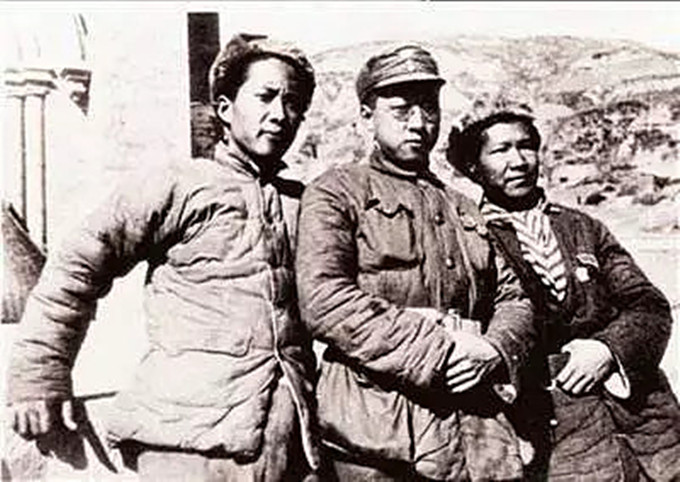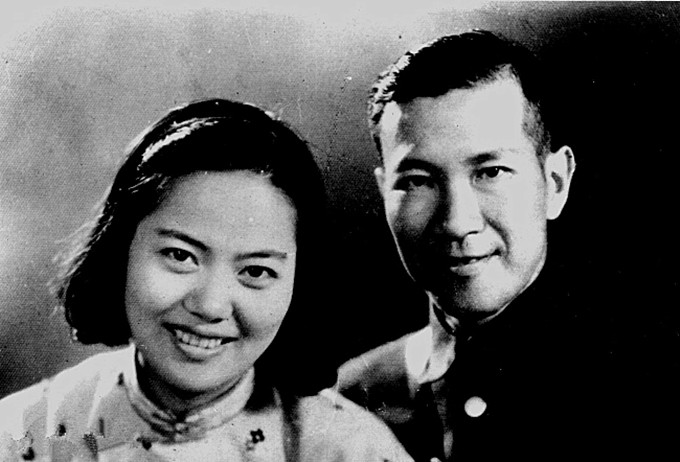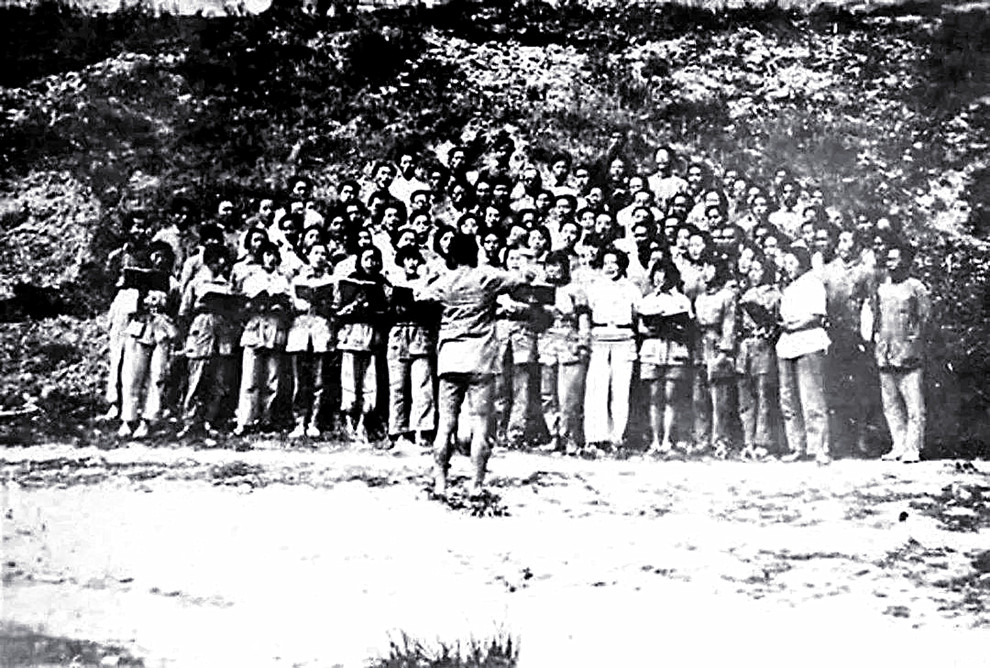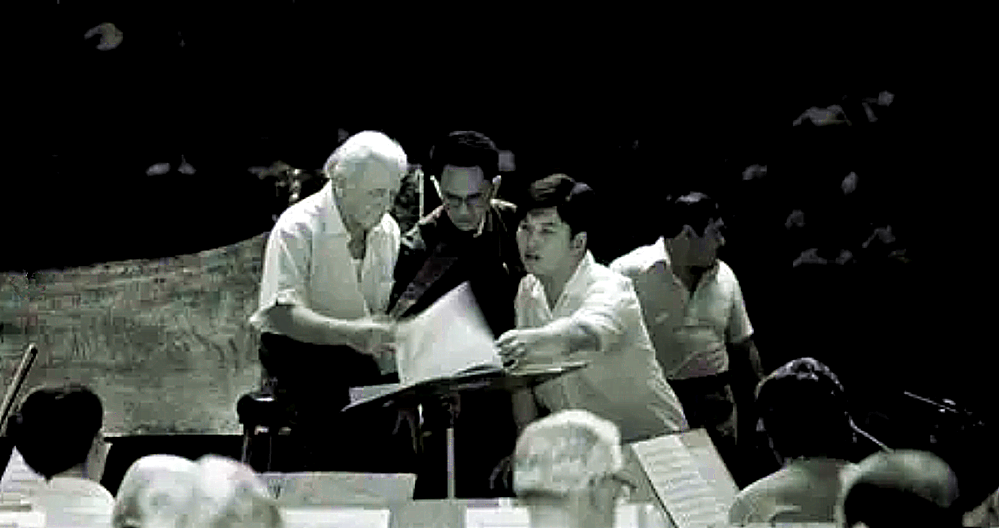| |
|
|
|
|
|
|
|
|
|
|
| |
| |
 |
|
| |
田润德 编译
文/图 2025-10-30 19:36 |
|
| |
|
|
|
|
| |
 |
|
|
|
| |
人民音乐家冼星海(1905年6月13日-1945年10月30日) |
|
|
|
| |
|
|
| |
2019德国新年音乐会 郎朗与杨松斯、巴伐利亚广播交响乐团演奏《黄河》
|
|
|
|
| |
|
|
|
|
| |
音乐历史上的今天
1945年10月30日,我国著名的音乐家、钢琴家冼星海在莫斯科因病逝世,终年40岁。
冼星海有"人民音乐家"之称,他是中国近现代音乐史上继聂耳之后又一位伟大的人民音乐家,代表作品有《黄河大合唱》《到敌人后方去》《在太行山上》《黄河大合唱》《生产大合唱》等。
1905年6月13日冼星海出生于澳门一个船工的家。早年冼星海曾在岭南大学附中学小提琴,后来相继在北大音乐传习所、国立艺专、上海国立音专学习,1929年冼星海远赴法国巴黎勤工俭学,1931年考入巴黎音乐学院在肖拉·康托鲁姆作曲班学习。1935年回国在上海参加抗日救亡活动。1938年11月赴延安,任鲁迅艺术学院音乐系主任。1939年加入中国共产党,1940年赴苏联考察,1945年因劳累和肺病逝于莫斯科。
今日视频:1、2019德国新年音乐会 郎朗与杨松斯、巴伐利亚广播交响乐团演奏《黄河》;2、纪录片《大师:冼星海》。 |
|
|
|
| |
 |
|
| |
人民音乐家冼星海 |
|
|
|
| |
冼星海 |
|
|
|
| |
星海(1905年6月13日-1945年10月30日),男,曾用名黄训、孔宇,祖籍广东广州府番禺县(现属广州市南沙区榄核镇),出生于澳门,中国近代著名作曲家、钢琴家,有“人民音乐家”之称,其作品中《黄河大合唱》最广为人知。1926年入北京大学音乐传习所,1928年进上海国立音专学习音乐。1929年去巴黎勤工俭学,师从著名提琴家帕尼·奥别多菲尔和著名作曲家保罗·杜卡斯。1935年回国后,积极参加抗日救亡运动。1938年赴延安,后担任鲁迅艺术学院音乐系主任。1939年6月,加入中国共产党
[1] 。1945年10月因劳累和营养不良,他的肺病日益严重,最后冼星海病逝于莫斯科。
|
|
|
|
| |
 |
|
|
|
| |
冼星海在上海进行创作 |
|
|
|
| |
1939年,冼星海在《致中共“鲁艺”支部的自传》中,讲述了早年求学的经历: |
|
|
|
| |
“父亲死时,我是一个怀腹子!祖父养我长大,到七岁时祖父死了。我和母亲靠着双手去奋斗,经过了将近三十年的惨淡生活,飘流无定的生活,到现在我和母亲还是为着生活奋斗……大革命时,我年纪还小。我在广州岭南大学附中念书,当时我是半工半读的一个学生,但我是时常接近学校里面饭堂的伙夫、工人和学校外的疍民,我并且组任过村童的工作。工人夜校我也去教过……在北平,我曾入‘北大’音乐传习所,专修音乐理论和提琴,也曾在‘北大’听过鲁迅先生的小说史,我又学过古琴和其它的中国乐器。我并在图书馆任管理员的职,这样的去学习音乐。在上海学习音乐,这时期相当的苦,学费全是借贷戚友的钱去学习,欠债累累,颇苦痛。当时又找不着适当工作来维持,母亲已年老,不忍她过于劳累。但在经济万分困难时,我仍不断地向上努力,求得我所需要的学识。” |
|
|
|
| |
In 1939, Shen
Xinghai recounted his early academic experiences in his "Autobiography
to the Communist Party's 'Lu Yilie' Branch": "When my father passed
away, I was a young boy! My grandfather raised me up until I was seven
years old. Then my grandfather died. My mother and I struggled with our
hands. After nearly thirty years of hard and miserable life, a life
without a fixed place to stay, we are still striving for survival...
During the Great Revolution, I was still young. I was studying at the
Guangzhou Lingnan University Preparatory School. At that time, I was a
student who worked part-time while attending school. But I often worked
as a cook, worker, and疍民 in the school's cafeteria, and I also took on
the job of working for village children. I also taught at the night
school of Peking University... In Beijing, I once entered the 'Peking
University Music Training Institute' to specialize in music theory and
the violin. I also heard Mr. Lu Xun's novel history at Peking University
and learned the guqin and other Chinese musical instruments. I also held
the position of a librarian. Through these efforts, I was able to study
music. In Shanghai, I studied music. This period was extremely
difficult. All the tuition was borrowed from friends to study. I was
deeply in debt and suffered greatly. At that time, I couldn't find a
suitable job to support myself. My mother was old and didn't want her to
be overly exhausted. But in the face of extreme economic difficulties, I
still kept striving upward to obtain the knowledge I needed." |
|
|
|
| |
 |
|
| |
1935年,巴黎音乐学院作曲班师生合影(右二为冼星海)(图片来源:《冼星海全集》) |
|
|
|
| |
In 1935, a group photo of the
students and teachers of the composition class at the Paris Conservatory
was taken (Xian Xinghai is the second from the right) (Image source:
"Complete Works of Xian Xinghai") |
|
|
|
| |
 |
|
| |
|
1935年,冼星海留法,在巴黎音乐学院期间(图片来源:《冼星海全集》) |
| In
1935, Xian Xinghai went to France. During his time at the Paris
Conservatory of Music (Image source: "Complete Works of Xian
Xinghai") |
|
|
|
|
| |
 |
|
| |
|
1938年春,冼星海教士兵唱救亡歌曲(图片来源:《冼星海全集》) |
| In
the spring of 1938, Xian Xinghai taught the soldiers to sing the
songs of national salvation (Image source: "Complete Works of
Xian Xinghai") |
|
|
|
|
| |
冼星海在《我学习音乐的经过》 |
|
|
|
| |
冼星海在《我学习音乐的经过》一文中回忆了自己如何在巴黎不惧穷困潦倒的生活,坚持勤工俭学,取得巴黎音乐学院的优秀的毕业成绩:
我曾在国内学音乐有好多年。在广州岭南大学教音乐的时候,感到国内学音乐的环境不方便,很想到法国去。同时,我奢想把我的音乐技巧学得很好,成功为“国际的”音乐家。正在考虑之际,凑巧得×××兄的帮忙,介绍了他在巴黎的先生奥别多菲尔(Paul
Oberdoeffer)给我,于是我下了很大的决心,不顾自己的穷困,在1929年离开祖国到巴黎去。到了巴黎,找到餐馆跑堂的工作后,就开始跟这位世界名提琴师学提琴。奥别多菲尔先生,过去教×兄时,每月收学费二百佛郎(当时约合华币十元左右)。教我的时候,因打听出我是个做工的,就不收学费。接着我又找到路爱日。加隆(Noel
Geallon)先生,跟他学“和声学”、“对位学”、“赋格曲”(Fugue,一种作曲要经过的课程)。加隆先生是巴黎音乐院的名教授,收学费每月也要二百佛郎,但他知道我的穷困后,也不收我的学费。我又跟“国民学派”士苛蓝港。多隆姆(唱歌学校——是巴黎最有名的音乐院之一,与巴黎音乐院齐名,也是专注重天才。与巴黎音乐院不同之处,是它不限制年龄。巴黎音乐院则只限廿岁上下才有资格入学。此外,它除了注意技巧外,对音乐理论更注意)这个学校的作曲教授丹地(V.d’Indy)学作曲,他算是我第一个教作曲的教师。
以后,我又跟里昂古特(Lio neourt)先生学作曲。同时跟拉卑(La
bey)先生学指挥。这些日子里,我还未人巴黎音乐院,生活穷困极了,常常妨碍学习。
我常常在失业与饥饿中,而且求救无门。在找到了职业时,学习的时间却又太少,在此时期我曾经做过各种各样的下役,像餐馆跑堂,理发店杂役,做过西崽(boy),做过看守电话的佣人和其他各种被人看作下贱的跑腿。在繁重琐屑的工作里,只能在忙里抽出一点时间来学习提琴,看看谱,练习写曲。但是时间都不能固定,除了上课的时间无论如何要想法去上课外,有时在晚上能够在厨房里学习提琴就好了,最糟的有时一早五点钟起来,直做到晚上十二点钟。有一次,因为白天上课弄得很累,回来又一直做到晚上九点,最后一次端菜上楼时,因为晕眩,连入带菜都摔倒,被骂了一顿之后,第二天就开除了。我很不愿把我是一个工读生的底细告诉我的同事们,甚至连老板也不告诉,因此,同事对我很不好,有些还忌刻我,在我要去上课的那天故意多找工作给我做,还打骂我,因此我也常打架。有一个同事是东北人,他看见我学习时,总是找出事来给我,譬如说壁上有丝尘,要我去揩等等。但我对他很好,常常给他写信回家(东北),他终于感动了,对我特别看待,给我衣服穿等等。可是我还不告诉他我入学的事。
我失过十几次业,饿饭、找不到住处,一切的问题都来了。有几次又冷又饿,实在支持不住,在街上软瘫下来了。我那时想大概要饿死了。幸而总侥幸碰到些救助的人,这些人是些外国的流浪者(有些是没落贵族,有些是白俄)。大概他们知道我能弹奏提琴,所以常在什么宴会里请我弹奏,每次给一二百佛郎,有时多的一千佛郎。有对白俄夫妇,已没落到做苦工,他们已知道了劳动者的苦楚,他们竟把得到的很微薄的工资帮助我——请我吃饭。我这样的过朝挨夕,谈不上什么安定。有过好几天,饿得快死,没法只得提了提琴到咖啡馆、大餐馆中去拉奏讨钱,忍着羞辱拉了整天得不到多少钱,回到寓所不觉痛哭起来。把钱扔到地下,但又不得不拾起。门外房东在敲门要房金,如不把讨到的钱给他,就有到捕房去坐牢的危险(其实不是为了学习,倒是个活路)。有一次讨钱的时候,一个有钱的中国留学生把我的碟子摔碎,掌我的颊,说我丢中国人的丑!我当时不能反抗,含着泪,悲愤得说不出话来——在巴黎的中国留学生很不喜欢我,他们都很有钱,还有些领了很大一笔津贴,但却不借给我一文。有时,我并不是为了借钱去找他们,但他们把门闭上,门口摆着两双到四双擦亮的皮鞋(男的、女的)。
我忍受生活的折磨,对于学音乐虽不灰心,但有时也感到迷惘和不乐,幸而教师们肯帮助我,鼓励我,在开音乐会演奏名曲时,常送我票。奥别多菲尔先生在一个名音乐会里演他的提琴独奏(ThaiS)时,不厌我穷拙,给我坐前排。这些对我意外的关怀,时时促使我重新提起勇气,同时也给我扩大了眼界。我的学习自己觉得逐渐有些进步,我写了好多东西,我学习应用很复杂的技巧。
在困苦生活的时日,对祖国的消息和怀念也催迫着我努力。我很喜欢看法国国庆节和“贞德节”的大游行。这两个节是法国很大的节日,纪念的那天,参加的人非常拥挤。有整齐的步兵、卫队、坦克趴、飞机队等。民众非常热烈地唱国歌,三色国旗飘扬。我每次都很感动。在1932年,东北失陷的第二年,到那些节日,我照例去看游行。但是那次群众爱护他们祖国的狂热,和法国国歌的悲壮声,猛烈地打动了我。我想到自己多难的祖国,和三年以来在巴黎受尽的种种辛酸、无助、孤单、悲痛、哀忿、抑郁的感情混合在一起,我两眼充满了泪水,回到店里偷偷地哭起来。在悲痛里我起了应该怎样去挽救祖国的危亡的思念。
我那时是个工人,我参加了“国际工会”。工会里常放映些关于祖国的新闻片和有一些照片。我从上面看到了祖国的大水灾,看到了流离失所、饥饿死亡的同胞;看到了黄包车(人力车)和其他劳苦工人的生活;看到了1927年大革命失败后党派分裂,国民党的大屠杀,……这些情形,更加深我的思念、隐忧、焦急。
我把我对于祖国的那些感触用音乐写下来,像我把生活中的痛楚用音乐写下来一样。我渐渐把不顾内容的技巧(这是“学院派”艺术至上的特点)用来描写、诉说痛苦的人生、被压迫的祖国。我不管这高尚不高尚。在初到法国的时候,我有艺术家的所谓“慎重”,我对于一个创作要花一年的功夫完成,或者一年写一个东西,像小提琴及钢琴合奏的《索拿大》,我就花了八个月的功夫。但以后,就不是这样了。我写自以为比较成功的作品《风》的时候,正是生活逼得走投无路的时候,我住在一间七层楼上的破小房子里,这间房子的门窗都破了,巴黎的天气本来比中国南方冷,那年冬天的那夜又刮大风,我没有棉被,睡也唾不成,只得点灯写作,那知风猛烈吹进,煤油灯(我安不起电灯)吹灭了又吹灭。我伤心极了,我打着战,听寒风打着墙壁,窗,猛烈嘶吼,我的心也跟着猛烈撼动。一切人生的
祖国的苦、辣、辛、酸、不幸,都汹涌起来。我不能控制自己
的感情,于是借风述怀,写成了这个作品,以后我有把对祖国的思念写成了《游子吟》、《中国古诗》和其它作品。
我想不到《风》那么受人欢迎,我的先生们很称赞它,旧俄的音乐家(现在已同情苏联),也是现在世界有名的音乐家普罗科菲耶夫也很爱它。并且它能在巴黎播音(上面说过的《索拿大》也被播)和公开演奏。 |
|
|
|
| |
 |
|
| |
冼星海黄河大合唱总谱手稿 |
|
|
|
| |
Xian Xinghai's manuscript of
the "Yellow River Cantata" score |
|
|
|
| |
 |
|
|
|
| |
冼星海和同志们在延安时的合影 |
|
|
|
| |
|
|
|
|
| |
 |
|
|
|
| |
冼星海与夫人钱韵玲的照片 |
|
|
|
| |
1938年1月末,著名教育家、社会活动家钱亦石去世,而他的女儿钱韵玲就是今天的女主人公。钱父去世后,他早前的学生冼星海听闻十分悲痛,专门赶来吊唁,并写了一首挽歌,想要在钱老师追悼会上让歌咏队咏唱。写好后便让歌咏队的派一个人来取歌谱,而来的人正是钱韵玲。
钱韵玲接过歌谱,看了几眼,心中越发难过,泪水再也止不住,如下雨般落了下来。此时冼星海并不知面前的姑娘是钱老师的女儿,自然被这突如其来的哭泣给吓到了,急忙上前安慰和询问,这才知道。从那以后他们的缘分算是真的开始了。
而早前之前,钱韵玲就知道冼星海,还是冼星海的迷妹,两人认识后因为钱老师这一层关系,便经常来往,加上他们对音乐、对艺术有相同的追求,感情也在急速发生变化,不久便确定了恋爱关系,紧接着就结婚了,从见面到结婚不过半年时间,结婚时,冼星海34岁,钱韵玲24岁。 |
|
|
|
| |
Famous
educator and social activist qian yishi died in late January
1938, and his daughter qian yunling is the heroine today.When
qian's father died, xian xinghai, one of his former students,
was so grieved that he came to pay his respects and wrote a
dirge to be sung at the memorial service.After finishing
writing, he asked the singing team to send a person to get the
music, and the person who came was none other than qian yunling.
Qian yunling took the music and looked at it for a few times.
She felt more and more sad, and her tears fell down like rain.At
this time xian xinghai and do not know in front of the girl is
the daughter of the teacher, naturally by this sudden cry to be
scared, hurried to comfort and ask, this just know.From then on
their relationship really began.
And earlier, before the Qian Yunling know xian, xian xinghai
seduction, because money teacher after two people know this
relationship, often contact, combined with their music, the
pursuit of art has the same feelings are also rapidly changing,
soon to determine the relationship, and then get married, from
meet to get married but half a year, got married, he 34, yun
ling, a 24-year-old. |
|
|
|
| |
 |
|
| |
冼星海和同志们在延安窑洞前 |
|
|
|
| |
为了达到“乐不惊人死不休”的艺术效果,星海对《黄河大合唱》中的“黄河怨”、“黄河颂”进行了无数次的修改,虚心听取专家和群众的意见。
首次演出的日子到来了,毛泽东和延安官兵、人民一道观看了演出,激动人心的音乐使人热血沸腾,《黄河大合唱》获得了空前的成功。毛泽东给予了冼星海很高的评价:你的手一动是千军万马的歌声。
演出后召开的总结大会上,大家各抒已见,多数同志都认为艺术感染力强,但也有个别人觉得“黄河怨”的女声独唱太过沉重。因此一时间差点被叫停演。星海表示尊重上级决定。
不久,星海向党组织表达了自己加入中国共产党的意愿。
回到窑洞,韵玲告诉星海毛主席送给星海一支“派克”钢笔和一瓶墨水,星海深受鼓舞,发誓要写出更多更好的作品。
星海光荣加入了中国共产党,他和韵玲的爱情结晶也在孕育之中……
周恩来来到了延安,向入党的星海表示祝贺的同时,还表达了自己对“黄河怨”的好评,称之为“哀中有愤,愤中有情”的好作品,并下令解除了停演令。
星海再一次登上了指挥《黄河大合唱》演出的舞台。歌声中,周恩来写下了如下两句:“为抗战发出怒吼,为大众谱出呼声”。
这时,星海和韵玲爱的结晶妮娜来到了人间,毛泽东邀请星海一家三口到自家作客,为即将到苏联为电影配乐,同时为八路军作抗日宣传的星海饯行。
一九四五年,星海病逝于克里姆林宫医院。 毛泽东写下了“为人民的音乐家冼星海致哀”一行寄托哀思的大字。星海精神长存人间…… |
|
|
|
| |
 |
|
| |
星海指挥延安鲁艺师生合唱队排练《黄河大合唱》(1939年)。 |
|
|
|
| |
Xinghai directed the
choir of yan 'an lu art teachers and students to rehearse the
Yellow River chorus (1939) |
|
|
|
| |
In
order to achieve the artistic effect of "no shocking music",
xinghai has made numerous revisions to "Yellow River complaints"
and "Yellow River ode" in the "Yellow River chorus", and humbly
listened to the opinions of experts and the public.The first day
of performance came, MAO zedong and yan 'an officers and men,
the people together to watch the performance, exciting music
makes people excited, "the Yellow River chorus" was an
unprecedented success.MAO zedong gave xian xinghai a high
evaluation: your hand movement is the song of thousands of
troops and horses.At the summary meeting held after the
performance, everyone expressed their opinions. Most of the
comrades thought that the artistic appeal was strong, but some
people thought that the female vocal solo of "Yellow River
resentment" was too heavy.So it was almost called off.Xinghai
expressed respect for the decision of the superior.Soon, xinghai
expressed his willingness to join the communist party of China
to the party organization.Back in the cave, yunling told xinghai
chairman MAO gave xinghai a "parker" pen and a bottle of ink,
xinghai was inspired, vowed to write more and better
works.Xinghai glorious joined the communist party of China, the
love child that he and yun ling are also in gestation...< / p >
< p > zhou enlai came to yan 'an, to join the party xinghai
congratulations at the same time, but also expressed his praise
of the "Yellow River resentment," as "there is anger in sorrow,
anger in love" good works, and ordered to lift the suspension
order.Xinghai once again took the stage to conduct the
performance of the Yellow River chorus.In the song, zhou enlai
wrote the following two sentences: "for the war of resistance
issued a roar, for the mass spectrum out of the voice."At this
time, xinghai and yun ling love crystallization Nina came to the
world, MAO zedong invited a family of three to their home
xinghai guests, for the upcoming Soviet union for the film
score, at the same time for the eighth route army anti-japanese
propaganda xinghai farewell dinner.In 1945, xinghai died in a
kremlin hospital.MAO zedong wrote a lament for xian xinghai, a
musician of the people.The xinghai spirit lives on... |
|
|
|
| |
 |
|
| |
冼星海和音乐界的朋友们 |
|
|
|
| |
Xian Xinghai and his friends
in the music world |
|
|
|
| |
 |
|
| |
1973年9月,美国费城交响乐团访华,指挥奥曼迪 |
|
|
|
| |
In September 1973, the
Philadelphia Symphony Orchestra of the United States visited China, and
the conductor was Omandi. |
|
|
|
| |
自 1949 年以来,中美两国之间长达二十多年的隔阂终于在
1973 年 9 月被打破。当时,来自费城交响乐团的 104 名乐手开始了为期 10
天的访华之旅,他们为中国的听众带来了德彪西、贝多芬、舒伯特和勃拉姆斯的作品,以及《黄河协奏曲》。
|
|
|
|
| |
After more than two decades
of estrangement between China and the US since 1949, a total of 104
Philadelphia Orchestra musicians kicked off a 10-day visit to China in
September of 1973, bringing Debussy, Beethoven, Schubert, and Brahms,
along with the Yellow River Concerto to the Chinese audience. |
|
|
|
| |
 |
|
| |
1973年9月,美国费城交响乐团指挥奥曼迪在和中央乐团的殷承中等人在研究乐谱 |
|
|
|
| |
In September 1973, Maundy,
the conductor of the Philadelphia Symphony Orchestra in the United
States, was working with Yin Chengzhong and others from the Central
Orchestra to study the musical scores. |
|
|
|
| |
 |
|
|
|
| |
郎朗(Lang
Lang),1982年6月14日出生于辽宁省沈阳市沈河区(原属大东区),中国钢琴家,联合国和平使者,毕业于美国柯蒂斯音乐学院。1997年与IMG经纪公司签约,开启职业演出生涯。2001在人民大会堂进行100周年百年庆典巡演,2002年获得伯恩斯坦艺术成就大奖。2003年,推出个人钢琴演奏专辑《柴可夫斯基/门德尔松协奏曲名录》。2005年,在白宫举行个人专场独奏会。 |
|
|
|
| |
Lang Lang, born on June 14,
1982 in Shenhe District, Shenyang City, Liaoning Province (formerly part
of Da Dong District), is a Chinese pianist and a UN Peace Ambassador. He
graduated from the Curtis Institute of Music in the United States. In
1997, he signed a contract with IMG Agency and began his professional
performing career. In 2001, he conducted a 100th Anniversary Centennial
Celebration tour at the Great Hall of the People. In 2002, he won the
Bernstein Art Achievement Award. In 2003, he released the solo piano
album "Catalogue of Tchaikovsky/Mendelssohn Concertos". In 2005, he held
a solo recital at the White House. |
|
|
|
| |
|
|
|
|
| |
Today in the
history of music
On October 4, 1982, Glenn Gould passed away due to a cerebral hemorrhage
at the age of 50 years and 9 days. In the Evergreen Cemetery in Toronto,
a granite tombstone in the shape of a piano was engraved with: Glenn
Gould.
Glenn Gould (Glenn Gould, September 25, 1932 - October 4, 1982)
was a Canadian pianist. He was born in Toronto, Ontario, and graduated
from the Royal Conservatory of Music in Toronto. He was renowned for his
performances of Bach's works.
Gould set his goal to become a pianist at
the age of 5, mastered Bach's "Harmonic Suite" Volume 1 at the age of
10, became the youngest graduate of the Royal Conservatory of Music in
Toronto at the age of 12, and made his first public performance with the
Toronto Symphony Orchestra at the age of 15. In 1955, he became famous
in the United States by performing "The Goldberg Variations", and then
signed a contract with Columbia Records and recorded this piece. In
1964, he stopped public performances and turned to the recording studio,
completing the recordings of all of Bach's piano concertos and the
"Harmonic Suite". In 1981, he re-recorded "The Goldberg Variations", and
this album became the starting point and endpoint of his career. On
October 4, 1982, he passed away due to a cerebral hemorrhage at the age
of 50.
Today's video: 1. Glenn Gould's "Bach: Goldberg Variations"; 2.
Glenn Gould's Legend: Life After Life (in English). |
|
|
|
| |
|
|
|
|
| |
|
|
|
|
| |
|
|
| |
大师:冼星海
|
|
|
|
| |
Gould's Legend: Life After Life and Before |
|
|
|
| |
未得原作者编者授权严禁转载www.mt77.com任何内容 |
|
|
|
|
|
|
|
|
|
|
|
|
|
|
.png)

